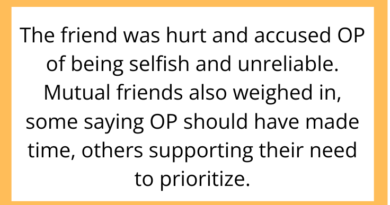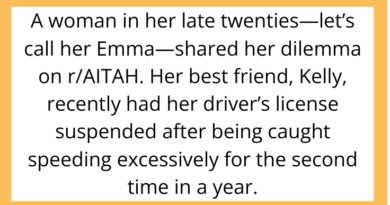AITAH for Refusing to Lend My Sister Money After She Called Me Selfish for Buying a New Car?
When family and finances collide, even the strongest bonds can start to fray. In today’s AITAH scenario, we dive into a situation that has sparked thousands of heated debates: Is it wrong to prioritize personal goals over a sibling’s needs, especially when they’re in crisis?
The Situation: A New Car and an Old Debt

A 32-year-old woman—let’s call her Sara—shared her story in the r/AITAH community. After years of driving an unreliable, aging sedan, she finally saved enough to buy herself a brand-new car. It wasn’t a luxury vehicle, but it was safe, dependable, and something she had been working toward for nearly a decade.
Enter her younger sister, Mia, 28, who recently lost her job. Mia has two kids and mounting bills. When she heard about Sara’s purchase, she called and asked if she could borrow $5,000 to help cover rent and utilities while she looked for new work.
Sara said no.
She explained that she’d just depleted her savings to pay for her car outright—so she wouldn’t have to take on debt—and she needed time to rebuild her emergency fund. She also reminded Mia that she had previously loaned her money twice before, and Mia hadn’t paid it back.
Mia didn’t take it well.
“She told me I was selfish and materialistic,” Sara wrote. “She said if I could afford a new car, I could afford to help her kids.”
Sara felt guilty—but also frustrated. She turned to Reddit to ask: AITAH for refusing to lend money after buying something for myself?
The Case for Sara: Boundaries and Financial Independence

Personal Goals Aren’t Selfish
Saving up for a car, especially when you’re used to unreliable transportation, is a huge achievement. Sara didn’t take out loans, didn’t splurge on something extravagant—she made a responsible financial decision.
Saying no to lending money doesn’t automatically make you selfish. In fact, it can be a necessary boundary, especially if past loans were never repaid.
Past Experience Matters
This wasn’t the first time Mia needed help—and Sara had already stepped in before. There’s a difference between helping family in a one-time crisis and being seen as the fallback plan every time things go wrong.
The Case for Mia: Family Should Help in Hard Times

Kids Come First
From Mia’s perspective, her children’s well-being is more important than a car. In her eyes, Sara’s choice to buy something she didn’t strictly need instead of helping her niece and nephew feels cold.
Some Reddit users pointed out that in families with strong communal values, it’s often expected to put the most vulnerable first—even if it means delaying personal plans.
Resentment and Perception
Mia may also feel shame and desperation—emotions that can easily morph into anger. Watching a sibling succeed while you struggle can bring up deep insecurities, even if the success was earned.
Reddit Weighs In: Is Saying No Really Selfish?

As usual, the AITAH community didn’t hold back. The majority sided firmly with Sara.
“You’re not an ATM,” wrote one commenter. “You worked for that car. You can be empathetic without sacrificing your own security.”
Others pointed out that lending money often damages relationships, especially when repayment isn’t likely.
However, a few users empathized with Mia’s desperation.
“If the kids are going to be homeless, and you have any way to help, even a little bit, you should consider it,” one person argued.
Financial Boundaries: How Much Do You Owe Family?
This story highlights a tricky question: Where’s the line between generosity and self-sacrifice?
Lending Money Can Ruin Relationships
Many financial experts advise against lending large sums to family. If you do, it’s often healthier to treat it as a gift rather than a loan—because repayment is never guaranteed, and the resentment from either side can last for years.
You Can’t Pour from an Empty Cup
Sara depleted her savings to make a practical purchase. Without a financial safety net, she’d be just as vulnerable if an emergency came up. Setting boundaries isn’t about greed—it’s about stability.
How to Navigate Similar Conflicts

If you ever find yourself in a similar situation, here are a few tips:
-
Be Honest but Kind: Explain your reasons calmly, without shaming the other person.
-
Offer Alternative Support: If you can’t give money, help them look for resources, apply for aid, or find other solutions.
-
Stick to Your Boundaries: If you’ve decided no, stand firm. Waffling will only prolong the conflict.
The Takeaway: Protecting Yourself Isn’t Villainous

Sara’s situation is a reminder that you’re not obligated to sacrifice your well-being to meet someone else’s expectations—even when it’s family. You can care about someone and still say no.
Saying no doesn’t mean you don’t love them. It means you love yourself, too.



